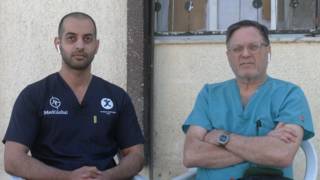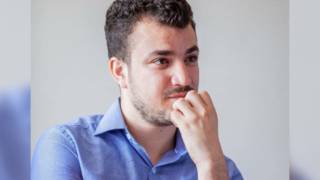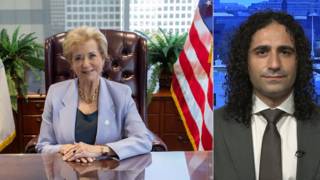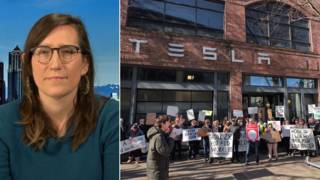HeadlinesAugust 02, 2018
Trump Calls on Sessions to End Russia Probe, Drawing Cries of Obstruction
President Donald Trump called Wednesday for his attorney general to immediately end special counsel Robert Mueller’s investigation into Russian interference in the 2016 election, prompting critics to charge the president is guilty of obstructing justice. In a Wednesday morning tweetstorm, Trump wrote, “This is a terrible situation and Attorney General Jeff Sessions should stop this Rigged Witch Hunt right now, before it continues to stain our country any further.” Congressmember Adam Schiff, the ranking Democrat on the House Intelligence Committee, responded, “This is an attempt to obstruct justice hiding in plain sight. America must never accept it.” At the White House, senior administration officials claimed Trump was merely expressing an opinion. This is White House Press Secretary Sarah Huckabee Sanders.
Press Secretary Sarah Huckabee Sanders: “Look, the president is not obstructing; he’s fighting back. The president is stating his opinion, he’s stating it clearly, and he’s certainly expressing the frustration that he has with the level of corruption that we’ve seen from people like Jim Comey, Peter Strzok, Andrew McCabe.”
Prosecutors Say Paul Manafort Stashed Millions in Offshore Accounts
Trump’s call for an end to the Mueller probe came on the second day of his former campaign manager’s trial in Alexandria, Virginia. Paul Manafort faces 18 charges, including tax fraud, bank fraud and money laundering. Prosecutors told a jury Manafort hid much of the $60 million he earned from lobbying as an unregistered foreign agent on behalf of pro-Russia Ukrainian officials by stashing it in undisclosed overseas accounts. Witnesses described Manafort as spending lavishly from the accounts on cars, luxury goods, home renovations—even a $15,000 ostrich-skin leather jacket. President Trump weighed in on the trial in a tweet, suggesting Manafort is being treated worse in jail than the notorious mobster Al Capone.
Separated Immigrant Child Dies Shortly After Release from ICE Jail
In South Texas, the American Immigration Lawyers Association says a migrant toddler who was separated from her family as part of President Trump’s “zero tolerance” border policy died shortly after being released from the Dilley Family Detention Center. Houston-based lawyer Mana Yegani tweeted, “The child died following her stay at an ICE Detention Center, as a result of possible negligent care and a respiratory illness she contracted from one of the other children.” Last year, lawyers with the ACLU and several other groups sued ICE, alleging it had been violating its own policy by locking up pregnant women at Dilley and four other immigration jails. The death came as about 700 children forcibly separated from their parents at the border have still not been reunited with their parents.
Federal Court Bars Trump from Withholding Funds to Sanctuary Cities
A federal court has declared President Trump’s executive order withholding funds from sanctuary cities in California unconstitutional. However, Wednesday’s ruling by a three-judge panel on the 9th U.S. Circuit Court of Appeals will lift a nationwide injunction against Trump’s crackdown on sanctuary cities. A lower court is now slated to consider reimposing that injunction. Cities across California—and in many other states—have passed sanctuary city policies barring local police from cooperating with federal immigration agencies.
White House Planning to Further Slash Refugee Admissions to U.S.
The New York Times reports the Trump administration is considering a plan to sharply reduce the number of refugees allowed to settle in the United States. The plan, which has the support of Trump’s anti-immigrant senior policy adviser Stephen Miller, would cap the number of refugees resettled next year to 25,000—a 40 percent drop from the current cap. The number of refugees allowed into the U.S. by the Trump administration has slowed to a near trickle, with the country already on pace to allow in the fewest number since the Federal Refugee Resettlement Program was created in 1980.
Zimbabwe: 3 Killed in Harare as Soldiers Attack Opposition Protesters
In Zimbabwe’s capital Harare, soldiers and police used tear gas, water cannons and live ammunition Wednesday to clear protesters who’d taken to the streets to allege that Monday’s presidential and parliamentary vote was rigged. At least three people were shot dead, and scores more were left injured—many of them filmed being beaten by soldiers. A spokesperson for the opposition party Movement for Democratic Change called the violence an attack on democracy.
Nkululeko Sibanda: “Today we saw the deployment of military tanks and firing of live ammunition on civilians for no apparent reason. Civilians are allowed to demand the respect of their rights in a lawful manner. Any disorder may be dealt with by the police, who are best trained for public order. Soldiers are trained to kill during war. We are seriously meant to wonder what this means. Are we in war? Are civilians the enemy of the state?”
The deadly crackdown on protests came after election returns showed President Emmerson Mnangagwa’s ruling ZANU-PF party is heading for a large parliamentary majority. There’s been no announcement of a winner in the presidential race, prompting international election observers to question the credibility of the vote.
Congo: New Investigation Bolsters Evidence of Ethnic Cleansing
In the Democratic Republic of the Congo, a new investigation by Vice News bolsters evidence of ethnic cleansing of the Hema ethnic minority in the eastern Ituri province. The violence began last December, as hundreds of machete-wielding militiamen swept through areas west of Lake Albert on Congo’s border with Uganda. About 120 communities were attacked, with hundreds killed, thousands of homes destroyed and some 350,000 people displaced. Investigative journalist Nick Turse reports the violence came after the U.S. abruptly cut support for peacekeeping efforts last year as part of President Trump’s “America First” policies.
Trump Preparing to Escalate China Trade War with Steeper Tariffs
President Trump doubled down on his growing trade war with China on Wednesday, threatening to increase tariffs on a range of Chinese products from 10 percent to 25 percent. The tariffs would target some $200 billion of Chinese goods. Trump launched a tit-for-tat series of tariffs after talks with Beijing broke down in May, prompting what Chinese officials have called the “largest trade war in economic history.”
Google Readying “Dragonfly” Censored Search Engine in China
Google is preparing to launch a service in China that will allow Chinese censors to block search terms about human rights, democracy, religion and peaceful protest. That’s according to The Intercept, which reports that the project, code-named Dragonfly, was launched in the spring of last year and accelerated after Google’s CEO met with a top Chinese government official in December. In response, Patrick Poon of Amnesty International told The Intercept, “The biggest search engine in the world obeying the censorship in China is a victory for the Chinese government—it sends a signal that nobody will bother to challenge the censorship any more.”
Amnesty International Blames “Hostile Government” for Malware Attack
Amnesty International says hackers recently targeted one its staffers in a sophisticated surveillance effort by a hostile government to spy on the group’s work. The staffer, who was working on a campaign calling for the release of jailed women’s rights activists in Saudi Arabia, received an anonymous message in Arabic in the WhatsApp smartphone application. The message was found to contain a link that would install the malware program Pegasus—developed by an Israeli cyberintelligence firm—which allows a third party to spy extensively on an encrypted phone’s calls, photos and messages. Amnesty warns the attack was likely part of a much broader effort to spy on activists in several countries across Asia, Africa and Europe.
Trump Administration to Allow “Skimpy” Health Insurance Plans
The Trump administration has cleared the way for insurance companies to expand their sales of inexpensive healthcare plans that circumvent many of the protections of the Affordable Care Act. Under the new rules, health insurers can sell plans originally designed for short-term use for up to 12 months, with an option to renew each year. The plans don’t have to cover pre-existing conditions, and often exclude coverage for prescription drugs, mental health and maternity care.
Pope Declares Catholic Church Will Oppose Death Penalty in All Cases
Pope Francis has declared the Catholic Church will oppose the death penalty in all instances, calling it an “attack on the inviolability and dignity of the person.” The pope’s declaration reverses long-standing church doctrine, which previously allowed for the death penalty in rare circumstances.
Philippines: Police and Security Guards Beat NutriAsia Strikers
And in the Philippines, labor unions and press freedom groups are condemning a violent crackdown on striking workers at a major food condiment producer. On July 30, police joined with security guards to attack a picket line outside a NutriAsia plant north of Manila. At least 10 people were injured, and 20 others arrested. One journalist was injured covering the strike, and five Filipino journalists were arrested, prompting condemnation from the Committee to Protect Journalists. All five were later released without charge.
Most popular
- 1
- 2
- 3
- 4
Non-commercial news needs your support
Please do your part today.











Media Options